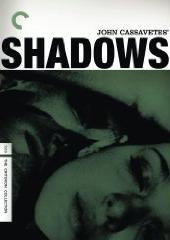Shadows review by Jackass Tom
John Cassavete’s Shadows seems more entrenched in the French New Wave than it does within the streets of Manhattan. As I watched the movie I kept thinking of how close in style it was to Godard's A bout de souffle or Breathless as its known in the states. On the top layer, both are filmed in black and white which in 1959 was becoming less common. The dates are interesting as Breathless was shot in August and September of 1959, while Shadows was released in November of 1959, so I would imagine that neither one had knowledge of the other. Both have a rugged graininess in the film stock, although Shadows was made on 16mm and Breathless 35mm. Both were obviously influenced by theories of Italian Neo-realism and portray their fictional world with an almost documentary view. Both films even employee jump cuts and in both cases this is probably in an effort to cut costs on a low budget film.
Improvisation was also a cornerstone in both films in both story and dialogue. Cassavetes even goes as far to state “THE FILM YOU HAVE JUST SEEN WAS AN IMPROVISATION” in the closing credits. There are even loose connections between the nihilistic Michel of Breathless and the wallflower, odd ball Ben. They are both entrenched in the beat generation and follow no external rules (Michel kills a cop, Ben gets into two fights).
But in terms of story, I would argue the two are very different. Godard's film focuses on the existential life of its two main characters, Michel and Patricia exclusively. Each scene contains either one of them or both. Shadows juggles three stories of overlapping characters: the three young nighthawks including Ben and Tom who relive the same drunken fun every weekend, the tense, interracial love story between Tony and Lelia, and jazzman Hugh trying to dig out a career while maintaining his art. None of the three stories holds precedence over the other, although for marketing purposes you’ll hear and see more about Tony and Lelia.
There are even philosophical differences in how the two movies treat their love scenes, or more specifically, how the female character reacts to the love scene. Patricia is in control of her feelings to the point where you wonder if she has any emotion attached to the physical act of love or Michel. Lelia is definitely more affected and emotional after her one night stand with Tony and remarks about how horrible it made her feel.
Enough with the comparisons though. Aside from its awkward love vignette, Shadows also touches on racial tension. The character of Lelia is one of the more interesting characters in the movie. Although she is African-American, her appearance allows her to pass as white (or at least other). She is more or less welcomed into a literary society through a love interest, and even fools Tony who all of a sudden "gets it" when he sees her darker skinned brother Hugh. Lelia tries to fit in with the intellectuals despite her brother Ben trying to bring her down. As far as being a commentary on inter racial relations in the late 50s and early 60s I found it to feel more authentic than the schmaltzy Guess Who's Coming to Dinner? Part of the reason for that is the point of Shadows is not to resolve any conflict but rather to reveal it. Its not a film that follows the standard Hollywood 28-step fairy tale process but is more focused on showing what Cassavetes believes is real life.
Shadows was definitely an important film for the independent filmmakers. It may not be obvious by looking at the films that were made in the early sixties... as there wasn't a major movement created out of Cassavetes improvisation. But later films like Mean Streets, Night of the Living Dead, and even Clerks show signs of influence in style as well as in attitude. The quality of the latest printing by Criterion Collection is good considering what shape the current negatives are believed to be in. But the film never had sharp quality. It was always a little rugged and street-worn. It will still be entertaining and amusing to fans of cinema verite, beat generation counterculture, and the beginnings of independent filmmaking. Those expecting a polished Hollywood film will likely be disappointed.







7 out of 10 Jackasses blog comments powered by Disqus
Search
Shadows

IMDB Link: Shadows
DVD Relase Date: 2009-02-17
DVD Aspect Ratio: 1.37:1
DVD Extras: Interviews, Restoration Demo, Silent Footage of a Cassavetes workshop, Stills, Trailer
DVD Producer: Criterion Collection